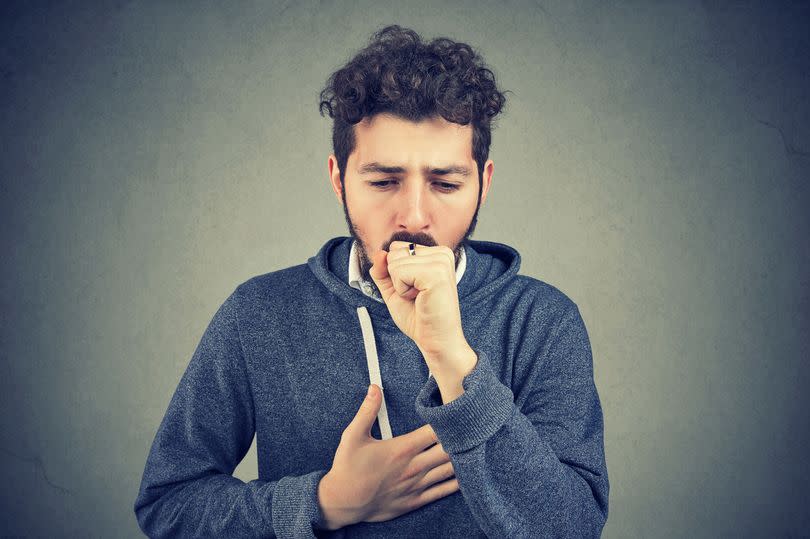When a cough means it's time to see a doctor - and when you should go to A&E

Most people will either have had a blast of the latest bug which has been doing the rounds or know someone who has. The cough which wouldn't go, lasting for weeks without let up, seems to have hit most people.
But while the majority of these have resolved themselves without medical help there are times a trip to the doctor is essential. With spring ahead we are likely to be facing even more bugs heading our way and the seasonal colds often come along with a cough of their own.
So how can we tell when we can get by with a trip to the pharmacist for some over the counter remedies and when is it time to head to the doctor? Dr Katie Tryon, Director of Health Strategy at Vitality Health, has come up with ways on how to prevent that “never-ending” cough, how to treat it and when additional help should be sought.
How do illnesses spread develop into new forms of cough?
Illnesses happen when the wrong kind of bacteria or viruses enter your body and overwhelm your immune system. They usually spread from person to person through normal daily life. That could be something as simple as breathing the same air as other people on public transport to having contact with someone that already has the illness.
Some short-term illnesses stick around longer than expected. That means they can create a kind of ‘feedback loop’ of symptoms that lead to more persistent problems, like a chronic cough. This is because your body is having trouble either clearing stubborn mucus, calming inflammation or repairing damaged cells.
When should you seek medical attention?
Most coughs last around three weeks. But if it goes on any longer than that, you should see your GP for further advice or medication. Especially if it’s causing issues like weight loss or fever.
Ask for an urgent GP appointment or get help from NHS 111 if your cough is very bad. Like if you have a hacking cough or cannot stop coughing, you feel very unwell, you have chest pain, the side of your neck feels swollen and painful, you find it hard to breathe, or you're coughing up blood.
How to prevent catching illnesses?
You can never fully stop yourself catching common colds and coughs. But you can take easy measures to protect yourself. The include:
Wash your hands often with warm soapy water to kill germs spread by other people and shared surfaces
Avoid touching your eyes, mouth and nose with unwashed hands throughout the day – these are the main entry points for pathogens
Avoid sharing towels with people in your household to stop the spread of germs
Stay active to keep your body and immune system in shape – even moderate exercise can build your immune defence, particularly in older adults and people with chronic diseases
Eat lots of plants, fruits and vegetables to make sure you’re getting essential vitamins and nutrients
Get a yearly flu vaccine if you’re eligible
Ways to help ease your cough?
Certain medications can help you alleviate symptoms. That includes nasal sprays, inhalers, lozenges, cough syrups and decongestants. These can be accessed through your GP or local pharmacist, who can help you to decide the best option for you.
If you have a headache, take some painkillers. If you have a sore throat use lozenges. And so on. There’s no need for you to feel any worse than needed.
A surprising amount of people try to fight a cold without taking any medication, but this only makes symptoms more uncomfortable. Just be sure to check the daily dosage and follow medical guidelines, and visit your GP if symptoms persist or you’re worried your symptoms could be more than a simple cold.
It's also important to read instructions that come with the medicine and listen to the advice from your pharmacist or doctor. This is especially crucial if you’re taking other medications or have other health conditions.
Above all though, listen to what your body is telling you. Allow yourself the necessary time needed to rest and recuperate.
Myth busting on what helps your immune system and avoiding catching bugs?
There are some myths around cold care which Dr Tryon says people need to forget. She said
Myth 1: You need supplements
Not true. Taking big doses of a single vitamin or supplement without guidance from a dietician will do nothing for your immunity.
Myth 2: Probiotics help immunity
There’s no evidence probiotics can help your immunity: Probiotics are great for gut health. But the jury is still out on whether they can do anything for your immune system.
Myth 3: Products boost immunity
Dr Tryon says for a real benefit you should balance rather than boost. she said: "A lot of products and marketing out there talks about ‘boosting’ your immunity. In reality, good immunity is a balancing act of healthy habits to help your body stay at its best naturally.
"If you’re eating a healthy balanced diet and doing regular exercise you’re already doing enough. Don’t go reaching for expensive products to do something that your body can do by itself."

 Yahoo News
Yahoo News 
